
This course has several intertwined threads:
Students who successfully complete this course should be able to:
| David Mutchler, Professor of Computer Science and Software Engineering | |
 |
Email: David.Mutchler <at> rose-hulman.edu |
| Office phone: (812) 877-8426 | |
| Office address: Moench F-204 (top floor, around the corner from most other CSSE offices) | |
| Home page: http://www.rose-hulman.edu/~mutchler | |
| Office hours: Feel free to stop by anytime. You can call or email first to see if I'm in the office. Or, make an appointment. | |
 |
|
| Doug Mann, freshman CS major | |
| Email: manndj <at> rose-hulman.edu |
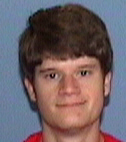 |
|
| Bryan Buccieri, freshman ME major | |
| Email: bucciebm <at> rose-hulman.edu |
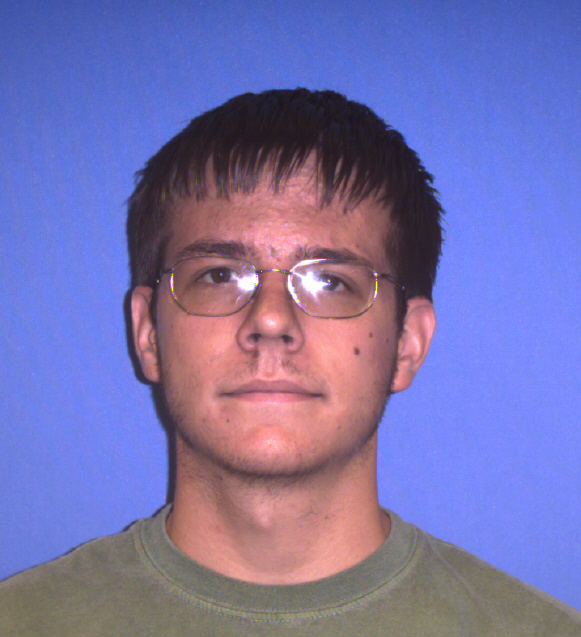 |
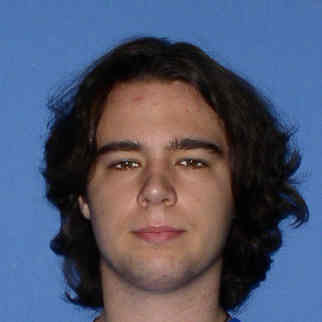 |
 |
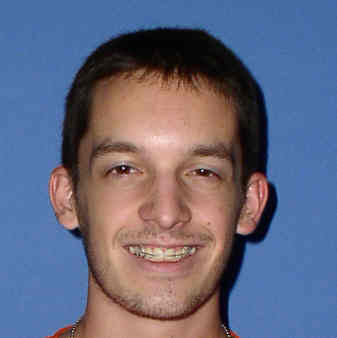 |
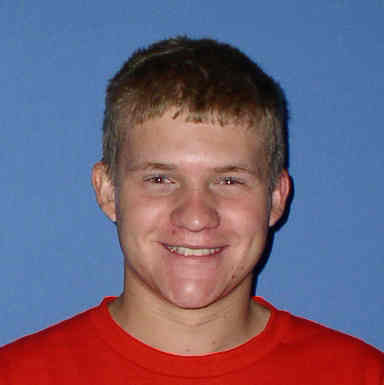 |
| Rex Chappell | Mike Jones | Andy Milluzzi | Kenneth Skaggs | Mark Swanson |
| Junior CS major | Sophomore SE major | Freshman CPE major | Sophomore CS major | Sophomore CPE major |
| Email: chappere | jonesmz | milluzaj | skaggskd | swansom1 |
In addition, any of the students who staff the CSSE lab F-217 should be able to help you, plus see "The Big Email Address" below.
If you send mail to
csse220-staff <at> rose-hulman.eduit will go to all instructors and student assistants for the course. You are more likely to get a quick answer by sending to this address than to any of us individually.
The CSSE lab, F-217, is staffed to assist students taking courses in the CSSE Fundamentals sequence, including 220. A detailed schedule of times when assistants should be available is posted.
Besides the instructors and assistants, other students in the course can often be a great source of help. And they will learn more if they explain things to you.
There is also the Learning Center.
Don't try to be the Lone Ranger in this course, especially if you do not find the course easy. If you find that you have worked on something for 30 minutes without making any progress, it's probably time to seek help! Software development is a team sport. The best programmers know that a fresh set of eyes can often spot a problem right away.
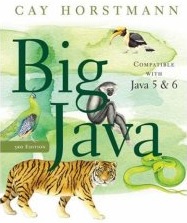
Big Java, 3rd edition, by Cay Horstmann
Paperback: 1204 pages
Publisher: John Wiley & Sons, Inc., 2008
ISBN-10: 0-470-10554-2
ISBN-13: 978-0-470-10554-2
Links: Companion Site · Source code · Errata

The Java™ Tutorials, Sun Microsystems.
On-line:
http://java.sun.com/docs/books/tutorial/
Publisher: Sun Microsystems (November 10, 2006)
Safari Tech Books Online – On-line access to Java (and other) books through the Rose-Hulman Logan Library web page
On-line:
http://proquest.safaribooksonline.com/?uicode=rosehulman/
| How to Access Safari Tech Books Online |
Note: If you get a message indicating that we have reached Rose-Hulman's limit on the number of concurrent users, tell your instructor so that we can try to get that limit increased. (We don't think that we have hit that limit, so far.) |
|---|
On-line books currently in Rose-Hulman's subscription to Safara Tech Books that may be helpful for CSSE220 include:
Safari Tech Books Online has thousands of other books that are not part of Rose-Hulman's subscription. If you find one that you want (e.g., by using Search Safari at the top-right of Safari's home page), email your instructor to see if it can be added to Rose-Hulman's subscription.
See Homework0 (emailed to you before the first session of class) for instructions for obtaining and installing the following (all of which are free):
I use ANGEL to post grades and materials that require restricted access (like quizzes and homework solutions). All online materials for the course will either be in ANGEL itself, or linked from ANGEL, or in Subversion repositories that I will create for you.
Many of the materials in ANGEL are actually links from ANGEL to AFS files, and thus are available via several mechanisms for accessing public AFS data. You can get to these materials:
Discussion forums on ANGEL are a place where you can discuss various aspects of the course, including the assignments, with other class members. The student assistants and I will read the discussions and sometimes respond to your posts. One way to enhance the Citizenship part of your grade is to post thoughtful questions, answers, and comments to the forums.
I welcome your suggestions for the course. Please tell me about things in the course that help you to learn, and things I might do to improve the course for you. If there is something that you'd like to tell me, but don't feel comfortable with me knowing who it comes from, you can use the Anonymous Suggestion Box survey that I have provided on ANGEL.
Each class session will normally include:
During class, please don't:
“Successful, engaged learners are responsible for their own learning. These students are self-regulated and able to define their own learning goals and evaluate their own achievement. They are also energized by their learning; their joy of learning leads to a lifelong passion for solving problems, understanding, and taking the next step in their thinking. These learners are strategic in that they know how to learn and are able to transfer knowledge to solve problems creatively. Engaged learning also involves being collaborative--that is, valuing and having the skills to work with others.”
-- From the North Central Regional Education Laboratory at www.ncrel.org/sdrs/engaged.htm, describing research by Jones, Valdez, Nowakowski, and Rasmussen (1994).
I expect you to check your email daily (not necessarily on weekends, although even that is not a bad idea). When I send mail to you, I will use your Rose-Hulman address. If you do not currently read mail that is sent to that address, please have it forwarded to wherever you do read mail.
Recall the Institute policy on academic misconduct:
“Rose-Hulman expects its students to be responsible adults and to behave at all times with honor and integrity.”
Exams and homework will be done on an individual basis except when explicitly noted. The simple rule of thumb for individual work is:
Never give or use someone else’s code or written answers.
Such exchanges are definitely cheating and not cooperation. The departmental statement on academic honesty has more detailed advice.
We encourage you to discuss the problems and general approaches to solving them with other students. However, when it comes to writing code, it should be your own work (or the work of your group if it is a group or partner assignment). If you are having trouble understanding how some library code works or pinning down a run-time or logic error in your program, by all means talk to someone about it.
If you use someone else’s ideas in your solution (or any other work that you do anywhere), you have to:
If you are ever in doubt about whether some specific situation violates the policy, the best approach is to discuss it with your instructor beforehand. This is a very serious matter that we do not take lightly. Nor should you.
You should never look at another student’s solution to get ideas of how to write your own code. Beginning the process of producing your own solution with an electronic copy of work done by other students is never appropriate.
Plagiarism or cheating will result in a negative score (i.e., less than zero) for the assignment or exam. Egregious cases will result in a grade of “F” for the course. More importantly, such dishonesty steals your own self-esteem. So don’t cheat.
Revised by Curt Clifton, written by Matt Boutell, based on format and lots of wording by Claude Anderson, and wholeheartedly supported by David Mutchler.
If you work hard in this class and have a professional attitude toward team and group work, you will earn a grade that you are proud of; if you don't work hard or rely too much on teammates carrying you, you will probably not be happy with the grade that you earn.
That said, here is how I will calculate your grade: First, I calculate your score for each of the following 4 categories:
| Weight | Category |
|---|---|
| 20% | Homework (including Angel quizzes on reading299), short exercises and in-class quizzes |
| 20% | Software development projects, excluding the two team projects |
| 30% | Team software development projects (Vector Graphics and the Capstone project) |
| 30% | Exams, including the final exam |
Let Smallest be the smallest of those 4 scores. Let Average be the weighted average of those 4 scores. Then your overall score is the smaller of Average and Smallest + 10.
For example, perhaps your average on the written homeworks (et al) is 84, your average on the non-team projects is 98, your average on the team projects is 76, and your average on the exams is 94. Then Smallest is 76 and Average is 84*0.15 + 98*0.40 + 76*0.15 + 94*0.30 = 91.4. Since 76 + 10 = 86 is smaller than 91.4, your overall score is 86.
I convert your overall score to a letter grade. I use the standard 10-point scale: 90 and up is an A, 85 to 90 is a B+, 80 to 85 is a B, and so forth. So in the example above, your final grade would be a B+.
Note that citizenship counts, where “citizenship” means participation in the CSSE 220 learning community. This includes attendance, promptness, preparation for class, positive participation in class and the online discussion forums, constructive partnership in pair and group assignments, timely completion of various surveys, and peer evaluation of other students’ code and of your team members for group projects. I may reduce your grade up to one letter grade for poor citizenship.
One more note: The in-class time in this course constitutes an important learning experience. You should attend class. Two unexcused absences will affect your Citizenship grade. After three unexcused absences you must speak with me about whether you can continue in the course.
If you find errors in the textbook or any of my course documents, please report them via the Bug Reports discussion forum on ANGEL. I will give a small number of extra credit points to the first person to report a given bug. The number of points will depend on the severity and subtlety of the bug that you report. I recommend that you subscribe to that discussion forum. (You can do that using the Communications tab in ANGEL.)
Homework K is assigned at session K and due at session K+1.
It is to your advantage to complete assignments by their due dates. However, we all have days when we are extremely busy, or times when an assignment takes longer to complete than we expect it will. To account for this, I give each student a “late day bank account” that starts with six late days.
You don't have to tell me that you earned/used a late day -- I'll see the time on your submission.
Some particular assignments may be designated as ”no late days“ assignments.
This syllabus, and indeed this course, draws upon ideas from many people. Many of the words in the syllabus are taken from the CSSE 120 and CSSE 221 syllabi.
Particular thanks go to: